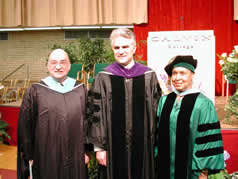By Lynn Bolt Rosendale
Calvin College’s 2001 Commencement ceremony featured
the largest graduating class in the college’s 125-year history.
Nearly 920 graduates and 3,400 parents, family members and friends packed
the Fieldhouse on May 19 to take part in the celebration.
Chief Justice William H. Rehnquist, perhaps the most well-known person
ever to speak at a Calvin graduation, addressed the graduates challenging
them to look at life with the right perspective.
“Life is like "a great shopping mall. Instead of clothes, CDs or electronic goods, the items for sale are worldly success, appreciation of music, knowledge of history, a scratch golf game, a close relationship with your daughter, a fulfilling commitment to your church, but you can’t purchase these things with money. You purchase them with time,” said Rehnquist.
The Chief Justice didn’t comment on any larger issues of the day nor did he mention the controversy that had surrounded his invitation to speak at Calvin’s commencement.
Several weeks before commencement, the April 27 edition of the student newspaper Chimes sparked the debate in an article headlined “William Rehnquist’s racist record revealed.”
The article highlighted Rehnquist’s affirmation of Plessy v. Ferguson, a landmark 1896 Supreme Court case which gave consent to legalized segregation in the southern United States, as a young law clerk in the 1950s. The article also accused Rehnquist of using legal methods to dissuade black voters as director of the Republican Party’s “Operation Eagle Eye” program in Arizona in the late 1950s.
The article prompted much discussion on campus about the selection of the commencement speaker and drew local media attention, some of which focused on the issue of freedom of speech.
“The issue was never about freedom of speech,” said Randal Jelks, Calvin history professor. “I was never against him speaking here. I just think that a different venue would have been better.
Rehnquist’s record on race was not the only reason for the controversy, however. The fact that the Chief Justice has no ties to the college was another issue.
Traditionally, Calvin has invited faculty, alumni or former faculty members to give the commencement address.
The controversy at Calvin resulted in a forum where colleagues were able to voice their opinions and dialogue among each other and a letter signed by 300 Calvin faculty, staff and alumni stating their opposition to the Chief Justice’s appearance was run as an ad in the Grand Rapids Press on commencement day.
"The positive aspect to this 'debate' story is that Calvin deeply cares about our response to the big questions of our day and it neither squelches disagreement nor has these debates outside a faith-informed context," said Calvin President Gaylen Byker. "The community forum that we had on campus was a wonderful testament to the integration of faith and learning that we talk about so much on this campus."

Chaplain Herman Keizer, Jr. (l.) and Dr. Jacquelyn Mabin Nickerson (r.)
receive the 2001 Distinguished Alumni Awards from Alumni Association
President-elect Ron Baylor.
Another highlight of the ceremony was the recognition of Distinguished Alumni Award winners Col. Herman Keizer ’65 and Jacquelyn Mabin Nickerson ’55.
During his early days as an Army chaplain, Keizer was assigned to the 1st Infantry Division in Vietnam. And during what is now a 33-year military career, Keizer's strongest memories are still of his time in the field.
"Thinking about combat ministry 30 years later is still a very emotional experience," he said. "That is when you are really faced with the possibility of your death and the hard question of what it means to love your enemies."
Keizer's assignments have included work as a special advisor on the drug and alcohol program both in the United States and later in Germany. He also was involved in several major policy initiatives which helped improve the lives of Army personnel, including authoring the policy on Accommodation of Religious Practices in the Armed Services and the Army Family Action Planning Process. During the 1990s, Keizer was Command Chaplain of the United States European Command.
Currently, he is working as an advisor for the Ambassador-at-Large for International Religious Freedom in the State Department. In this position he is responsible for monitoring religious freedom issues in all of Africa and the Balkans.
Just after her high school graduation Jacquie Nickerson’s father passed away so she stayed in Grand Rapids, beginning her studies at Grand Rapids Junior College. To finish her college years, she turned to an unlikely choice for African Americans at that time: Calvin College.
"Calvin was the epitome of educational excellence," she said. "The scholarship was high and the school was so well respected. I figured I could go to an outstanding school right in my own backyard."
It was a challenge to be one of just three African Americans on the Franklin campus, but Nickerson persevered and graduated with an education degree. After graduation she taught for five years and then went to graduate school at Michigan State. She then worked at MSU's Mott Institute for Community Improvement, developing field experiences in urban education in Detroit, Flint and Lansing. During this time, Michigan Governor William Milliken appointed her to the Northern Michigan University Board of Governors, where she eventually served as chairperson.
Now retired from MSU, Nickerson continues to stay connected to her interest in education as a speaker and consultant. She also travels and serves her church as a lay Eucharistic minister.